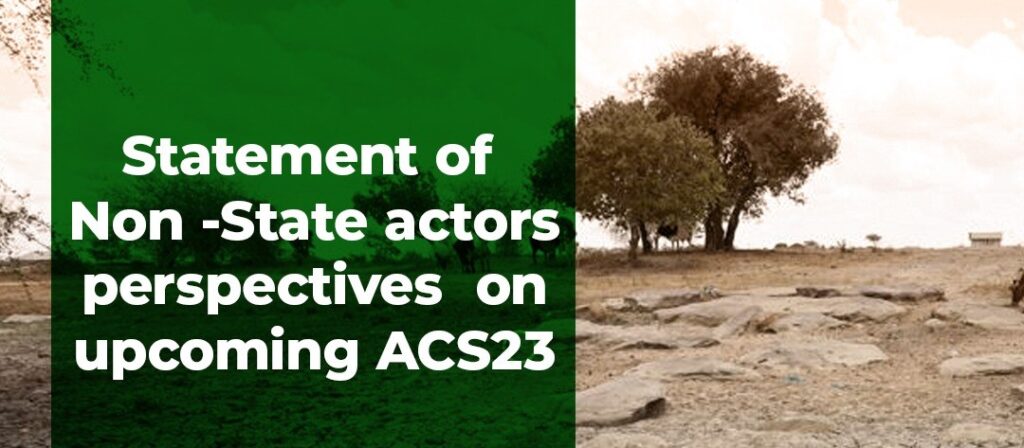KENYA: Ahead of COP28, Non-State Actors Ready to Collaborate Towards Implementation of Africa Climate Declaration

Sr. Jecinter Antoinette Okoth, FSSA
Members of the Africa Climate Summit – Non-State Actors Steering Committee (ACS-NSA), during their sideline meeting when the 2023 climate summit was ongoing in Nairobi, Kenya, promised to collaborate with other actors to implement the declaration that was released after the three-day summit.
The ACS-NSA is a platform that strives for advancement for a pro-African agenda in all key climate spaces and comprises of representatives from diverse groups in Africa including regional Civil Society Organizations (CSOs), indigenous people, faith actors, trade unions, private sector entities, farmer organizations, women and gender constituencies, academia, research institutions, and conservation organizations.
In their statement shared with AMECEA Online Friday, September 8, the steering committee members expressed their optimism towards the declaration as a forward step towards accomplishing more ambitious and comprehensive climate action in Africa and globally.
Ahead of the 2023 United Nations Conference of the Parties commonly referred to as COP28 and also prior to the 2023 Sustainable Development Goals (SDGs) summit aimed to mark the beginning of a new phase of accelerated progress towards the Sustainable Development Goals, the Africa faith actors have stressed that, developed countries need to “fulfil their historical responsibility and provide adequate and predictable finance, technology transfer, and capacity building to support adaptation, mitigation, loss and damage in Africa.”
In their Friday statement, participants who were meeting at All Africa Council of Churches (AACC) stood firm on their position to reject the promotion of Carbon Markets that are not responsive and do not serve the climate justice imperatives for Africa as they “urge for continued dialogue in the spirit of closing knowledge gaps on Carbon Markets that are apparent, at all levels.”
They called on African leaders to commit to “a just and equitable transition to renewable energy, as they ensure that energy access is prioritised for the poor and marginalised and that community ownership and participation are guaranteed.”
At the same time, as they promise to collaborate with the Heads of State and other stakeholders in the implementation of the Africa Climate Summit’s Declaration and in collectivizing Africa’s position towards COP28, the Non-state Actors urged African leaders “to stand by the principles of climate justice, human rights, gender equality, and intergenerational equity in all climate policies and actions.”
Analyzing the Nairobi Declaration that was issued by the Heads of States on September 6, after the summit, representatives from CSOs acknowledged the urgent need for the global community “to decrease emissions, decarbonise economies and align with the Paris Agreement,” as they appreciate “the Declaration for reaffirming the principles of common but differentiated responsibilities and equity, which are vital for a just and efficient global response.”
They further commended the Declaration for acknowledging the problem of loss and damage caused by climate change, which is already affecting several African communities, and “urged the international community to put into effect the Loss and Damage Facility established during COP27 and to provide sufficient and consistent assistance to the countries and individuals who are most vulnerable.”
Besides, the commendations, the Faith actors noted that the Nairobi Summit missed an opportunity to have a strong African position that established the route to addressing the climate crisis.
“We express our disappointment that the Declaration does not prioritize adaptation as a critical concern for Africa, and leaves it a mere peripheral issue,” reads part of the Friday statement as the representatives from various African countries underscore, “We would like to remind the Heads of States that adaptation is not only crucial for survival but also a matter of justice.”
The noted that Africa is one of the most affected regions by climate change, even though it contributes the least to its causes.
In this case they urged the authorities “to accord equal attention and resources to both adaptation and mitigation in their national and international actions and that adaptation strategies be designed based on local knowledge, needs, capacities, and human rights principles.”
They also observed that the Declaration “does not adequately address the emotive issue of just transition, which is crucial for ensuring that no one is left behind in the shift to a low-carbon economy,” hence the NSAC urged Heads of State “to adopt a more comprehensive and inclusive approach to just transition that is contextual and responsive to African realities, aspirations, desires, and which will discourage experimentation on false solutions that exacerbate climate crisis.”
“This approach involves the meaningful participation of workers, communities, civil society, and other stakeholders in planning and implementing policies that promote decent work, social protection, human rights, gender equality, and environmental justice,” they disclosed and concluded that such approach “should ensure the vast resources driving the transition, including wind, solar and geothermal, as well as critical minerals spread across the continent, restore hope to the people who have known such resources to be source of pain, conflict and misery.”


